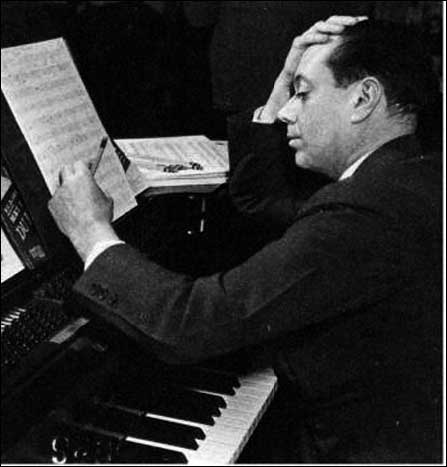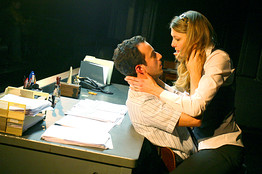Most of today’s Wall Street Journal drama column is devoted to David Cromer’s off-Broadway staging of Our Town, followed by a brief report on BAM Harvey’s Winter’s Tale. The headline tells the story. Here’s an excerpt.
* * *
What are the true classics of American theater, the shows that have decisively survived the test of time and now look to be of permanent significance? While I can think of a fair number of plays that are credible candidates for the top-five list, only two, Tennessee Williams’ “The Glass Menagerie” and Thornton Wilder’s “Our Town,” strike me as absolutely inevitable. That David Cromer should have directed both of these plays in close succession might well seem presumptuous, but Mr. Cromer appears to have the imaginative wherewithal to put his stamp on any number of classics. Like the haunting “Glass Menagerie” that he staged in January for Kansas City Repertory Theatre, Mr. Cromer’s rethinking of Wilder’s 1938 masterpiece, which has opened Off Broadway after a much-praised run in Chicago, is a re-creative landmark, at once arrestingly original and essentially faithful in its approach to the author’s well-loved text.
As usual with Mr. Cromer, most of what happens in this production is pretty much what the author had in mind, only more so. Wilder’s purpose in writing a play without scenery, as he explained in 1939, was to stimulate “the cooperative imagination of the audience” by offering it a deeper, more poetic realism, one not dependent on the old-fashioned traditions of naturalistic stage design. Accordingly, Mr. Cromer and Michele Spadaro, his set designer, have rebuilt the interior of the Barrow Street Theatre as a three-quarter-round performance space with aisles wide enough to allow the performers to pass among the spectators. (The original Broadway production was performed in a conventional proscenium-stage theater.) The “stage” is the floor, the “set” eight chairs and a pair of wooden tables that look as though they’d been pilfered from the basement of a small-town church. No attempt of any kind is made to suggest the outward appearance of Grover’s Corners, the turn-of-the-century New Hampshire village where “Our Town” is set. Even the “costumes” worn by the cast are nondescript modern-day street clothes identical to those worn by the members of the audience.
 The result is a performance that doesn’t feel like a performance at all. It’s as though the actors were simply showing us the play, an illusion underlined by the fact that Mr. Cromer has cast himself as the Stage Manager who narrates “Our Town.” He speaks his lines in an unsentimental, utterly matter-of-fact way, thereby giving the impression that he is not playing a character but merely being himself. (I actually saw him strolling through the lobby before Monday’s preview, wearing the same outfit that he wears onstage.) Mr. Cromer’s seemingly artless anti-acting is central to the effect of this production, in which the wall that separates illusion from reality becomes as porous as the one that separates the actors from their audience….
The result is a performance that doesn’t feel like a performance at all. It’s as though the actors were simply showing us the play, an illusion underlined by the fact that Mr. Cromer has cast himself as the Stage Manager who narrates “Our Town.” He speaks his lines in an unsentimental, utterly matter-of-fact way, thereby giving the impression that he is not playing a character but merely being himself. (I actually saw him strolling through the lobby before Monday’s preview, wearing the same outfit that he wears onstage.) Mr. Cromer’s seemingly artless anti-acting is central to the effect of this production, in which the wall that separates illusion from reality becomes as porous as the one that separates the actors from their audience….
The Bridge Project, in which London’s Old Vic and New York’s BAM Harvey Theater are jointly producing a pair of classics directed by Sam Mendes, has now opened the second installment of its inaugural offering, a staging of “The Winter’s Tale” that is even more of a mixed bag than “The Cherry Orchard,” with which it is playing in repertory. Mr. Mendes and his British-American cast have reconfigured Shakespeare’s complex, coincidence-laden play as a semi-modern domestic melodrama whose 19th-century setting sheds no clarifying light on the text, just as the actors, fine though they are, mostly fail to find the music in the verse….
* * *
Read the whole thing here.
Archives for February 2009
TT: And they could sing, too
I’ve been reflecting in recent days on Stephen Sondheim: The Story So Far… and Richard Rodgers: Command Performance, both of which include rare “demo recordings” in which Sondheim and Rodgers can be heard singing and playing their own songs. Nowadays we take singer-songwriters for granted–they’ve even started to pop up on Broadway–but very few of the major songwriters of the golden age of American popular song were also known as performers, and Johnny Mercer was the only one to distinguish himself as a professional singer.
 On the other hand, a fair number of songwriters active in the Thirties and Forties left behind records of their singing, some of them commercial and others demos that were cut to show other performers how their new songs went. I find these recordings, especially the self-accompanied performances of “Anything Goes” and “You’re the Top” made by Cole Porter for Victor in 1935, to be wonderfully illuminating, if not always well sung. (Both recordings are included on this album and can also be downloaded from iTunes.)
On the other hand, a fair number of songwriters active in the Thirties and Forties left behind records of their singing, some of them commercial and others demos that were cut to show other performers how their new songs went. I find these recordings, especially the self-accompanied performances of “Anything Goes” and “You’re the Top” made by Cole Porter for Victor in 1935, to be wonderfully illuminating, if not always well sung. (Both recordings are included on this album and can also be downloaded from iTunes.)
All this is the stuff of my “Sightings” column in Saturday’s Wall Street Journal, in which I talk about what recordings by golden-age songwriters can tell us about the men who made them. If you’re curious, pick up a copy of tomorrow’s paper and see what I have to say.
UPDATE: Read the whole thing here (and listen to a sound clip of Cole Porter singing “Anything Goes”).
TT: Almanac
“Poets, as a class, are business men. Shakespeare describes the poet’s eye as rolling in fine frenzy, from heaven to earth, and giving to airy nothing a local habitation and a name, but in practice, you will find that one corner of that eye is generally glued on the royalty returns.”
P.G. Wodehouse, Uncle Fred in the Springtime
TT: Two landmarks
Yesterday Andrea Schulz, my editor at Houghton Mifflin Harcourt, e-mailed me three possible dust-jacket designs for Pops: A Life of Louis Armstrong. “I am thrilled by these amazing designs, truly exuberant in a way I almost never am when sending this sort of thing,” she wrote. “I think they’re fabulous, in that way that good designers take you to places you don’t expect.” I agree–and I very much look forward to posting the finished product.
This morning I’ll be sending the copyedited manuscript back to Harcourt, complete with my final changes and next-to-last corrections. I still have to read the page proofs, but the hard editorial work is over: Pops is now officially finished. After that I’ll catch a cab to LaGuardia, followed in short order by a plane to Raleigh, North Carolina.
More as it happens….
TT: So you want to see a show?
Here’s my list of recommended Broadway, off-Broadway, and out-of-town shows, updated weekly. In all cases, I gave these shows favorable reviews (if sometimes qualifiedly so) in The Wall Street Journal when they opened. For more information, click on the title.
Warning: Broadway shows marked with an asterisk were sold out, or nearly so, last week.
BROADWAY:
• Alfred Hitchcock’s The 39 Steps * (comedy, G, suitable for bright children, reviewed here)
• August: Osage County (drama, R, adult subject matter, reviewed here)
• Avenue Q * (musical, R, adult subject matter and one show-stopping scene of puppet-on-puppet sex, reviewed here)
• The Little Mermaid * (musical, G, entirely suitable for children, reviewed here)
• South Pacific * (musical, G/PG-13, some sexual content, brilliantly staged but unsuitable for viewers acutely allergic to preachiness, reviewed here)
OFF BROADWAY:
• Aristocrats (drama, G/PG-13, too complicated for children, closes Mar. 29, reviewed here)
• Enter Laughing (musical, PG-13, extended through Mar. 20, reviewed here)
• The Fantasticks (musical, G, suitable for children capable of enjoying a love story, reviewed here)
 • Love/Stories (or But You Will Get Used to It) (one-act plays, PG-13, vastly too complicated for children, extended through Mar. 30, reviewed here)
• Love/Stories (or But You Will Get Used to It) (one-act plays, PG-13, vastly too complicated for children, extended through Mar. 30, reviewed here)
• Ruined (drama, PG-13/R, sexual content and suggestions of extreme violence, closes Apr. 12, reviewed here)
CLOSING SOON OFF BROADWAY:
• The Cripple of Inishmaan (black comedy, PG-13, closes Mar. 15, reviewed here)
CLOSING NEXT WEEK OFF BROADWAY:
• The Cherry Orchard (elegiac comedy, G, not suitable for children or immature adults, closes Mar. 8, reviewed here)
CLOSING NEXT WEEK IN CHICAGO:
• The Little Foxes (drama, PG-13, adult subject matter, closes Mar. 8, reviewed here)
• Macbeth (tragedy, PG-13/R, nudity and graphic violence, closes Mar. 8, reviewed here)
CLOSING NEXT WEEK IN LENOX, MASS:
• Bad Dates (comedy, PG-13, closes Mar. 8, reviewed here)
TT: Conundrum
Outside of their all being mysteries of one sort of another, what do these books have in common?
Blood on the Bannisters
Excuse My Gat! Gore by the Gallon
The Man with the Missing Toe
Severed Throats
Three Dead on Tuesday
The answer is below the fold.
TT: Almanac
“It has been well said that an author who expects results from a first novel is in a position similar to that of a man who drops a rose petal down the Grand Canyon of Arizona and listens for the echo.”
P.G. Wodehouse, Cocktail Time
TT: The countdown begins
My publicist at Houghton Mifflin Harcourt has just advised me that the official publication date for Pops: A Life of Louis Armstrong will be December 2, 2009. It is, in other words, a Christmas book, eminently suitable for gift-related purposes.
Mark your calendar!
